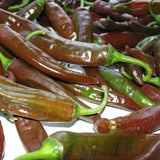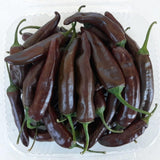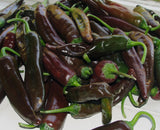Mareko Fana Berbere Pepper
Capsicum annuum
Long, slender brown cayenne chiles with medium heat from the Mareko region of Ethiopia. These peppers are most well-known for their use in Berbere, a traditional spice blend used in Ethiopian cuisine for centuries, and Mareko is particularly famous for its berbere peppers.
This variety is a genetically diverse population with occasional red peppers, though seeds are only saved from the brown ones. Most of the fruits are thick-fleshed, but some are thinner.
This variety was originally selected by an agricultural extension agent and researcher named Fana Woldegiorgis who studied at Haramaya University in the Harrar region. Menkir Tamrat is an Ethiopian tech-worker turned farmer who introduced these seeds and other Ethiopian varieties to Fred Hempel, who shared this variety with us, and who runs Artisan Seeds in Sunol, CA,. Menkir adds: "It's believed the original ancestors of Mareko peppers came to Ethiopia at the dawn of the seventeenth century from Goa, India, courtesy of Jesuit missionaries (mostly Portuguese and Spanish) who were in Ethiopia trying to convert the country to Catholicism and to find out about the fables of Prestor John". Berbere refers both to the dried pepper pods AND the powder. Thank you Fana, Menkir, and Fred!
Also known as the Ethiopian Brown Pepper, Ethiopian Brown Chile Pepper, and Ethiopian Berbere.
Photos by Artisan Seeds.
Days to maturity: 85 days after transplant
Seeds per pack: 15-20
Germination rate: 82% on 08/13/2025
Planting / harvesting notes
Start seeds indoors 8-10 weeks before the last frost and transplant into the garden well after the danger of frost. Keep seedlings moist but do not overwater. Transplants should be initially watered in well, and plants will be most productive with regular irrigation and full sun.
Seed keeping notes
Peppers are generally self-pollinating, though we isolate different varieties of the same species by at least 50 feet, in hopes that flying insects will not cross pollinate them unexpectedly. There are several important species of peppers, so check your scientific names! Pepper seeds are ripe when the fruits have turned their final fiery color - in this case, sunset-orange. Cut the fruit, scrape out seeds, and lay them out to dry on a labeled screen or paper product in a ventilated place away from direct sunlight for a week or two. Drying the peppers before seed extraction can slightly lower your germination rates, but works fine for home seed saving as long as the peppers do not rot.











